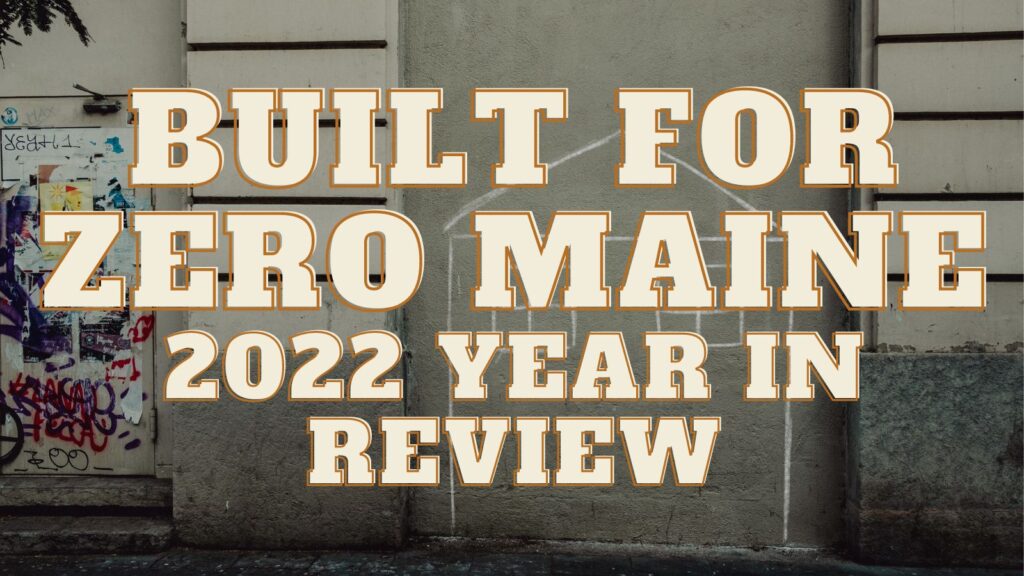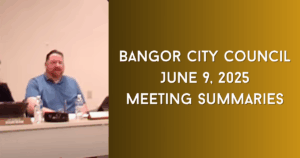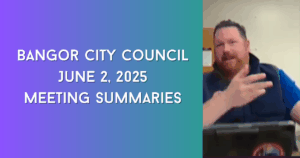
Bangor City Council will be receiving another presentation from Built for Zero on January 23, 2023. Hopefully it will prove more enlightening than the meeting from October 3, 2022.
Based on updates provided throughout the year by the Maine Built for Zero team, there are some important questions to be asked.
The By-Name List (BNL)
What is the status of that list? According to BfZ Maine there was a deadline set for December 15th to achieve quality data for that list. With the City of Bangor in the midst of allocating ARPA funding, it is crucial that they have the best data available for decision making. How can they measure the impact of the allocations they are making if they don’t have good data to start with?
In the August 2022 MaineHousing Board Meeting packet, a deadline of December 15, 2022 was set to achieve quality data. No update on progress toward the goal was provided in the December 2022 Board Meeting packet.
Was that goal met? Where does it stand? Have the Hubs provided data quality scorecards for review?
How is Built for Zero getting the data for that list?
On October 3rd, the Bangor City Council Government Operations Committee met with Hub 7 Coordinator Jenn Weatherbee to learn about BfZ and the status of Hub 7. She said she was working primarily on building the By-Name List, but it was unclear how or from what sources she was gathering data. The December 2022 MaineHousing Board Meeting Packet reported Hub coordinators were exploring solutions to obtain information to add to the BNL from entities without HMIS.
What sources of data relevant to the BNL have been identified for Hub 7? How is the list currently being stored? Who has access to view and/or update the list? How does the newly redesigned Coordinated Entry System cited in the October 2022 MaineHousing Board Packet fit into the BNL storage and maintenance? Is the CES software separate from HMIS or is it a set of operational procedures?
Real-time data for resources
Most of the information shared about the BfZ progress has focused on collecting data for the BNL, but nothing has been said in MaineHousing Board Meeting packets about the other major portion of the Built for Zero methodology: real-time data on available resources.
What is the current planning status there? It seems like the BNL and taking stock of resources could be done simultaneously. When this information about resources becomes available, will it be shared with the general public, or will it be reserved for only the Homeless Response team to access?
Involving the City of Bangor
Throughout the year, Bangor City Council made it seem as though they were intimately involved with the implementation of BfZ in Hub 7. Based on the October 3rd meeting with Jenn Weatherbee, they appeared to be in the dark about the methodology, the stage of the Hub 7 implementation process, and most startling, their part in the Homeless Response System.
What is the City of Bangor’s current involvement in Hub 7? Is Built for Zero able to aggregate BNL data in real time for municipalities, such as Bangor, to make funding decisions and housing investments based on accurate current needs? What does Hub 7 see as the ongoing role for Bangor’s city government in Built for Zero?
Where’s the overall plan?
For a program of this size and scope, I assume there is a documented roadmap of all the parts of the plan. Is there an overall documented strategy with goals, deadlines, and milestones for the entire Maine BfZ program? Currently all that has been made available for public consumption is the one six-month action cycle of achieving quality data for the BNL. Being able to see that plan would make more sense than trying to glean Built for Zero’s progress and trajectory from Board packet updates.
When all the pieces come together, what will Built for Zero look like in Maine?
There will come a point when all of the teams and pieces needed for success will be implemented. During Built for Zero’s presentation to Bangor City Council it would be great if they could illustrate what someone who may have just lost their housing might experience from homelessness-to-housed under a successful Built for Zero program in Maine.
Note: I reached out to MaineHousing’s Scott Thistle via e-mail with these questions on December 23, 2022. No response as of publishing time on January 4, 2023. I will update this post should I receive a response.
A Year Built for Zero Maine’s MaineHousing’s Board Meeting Updates
Each monthly heading contains a link to the MaineHousing Board Meeting packet for that month.
January 2022
No mention of Built for Zero.
February 2022
From the meeting minutes included in March 2022’s board packet:
Lauren [Bustard] went over key components of the redesign. She discussed the structure of nine service hubs; the roles of the service hubs, and who should the staff be in each hub. She explained the implementation plan with Community Solutions and their Built for Zero initiative. The Built for Zero Initiative is a rigorous national change effort designed to help a core group of committed US communities end chronic and veteran homelessness. Lauren reviewed for the Commissioners the nine Hub coordinators that have been hired.
March 2022
Part of the homeless system redesign is a statewide leadership team and the program that is being implemented is Built For Zero. We are out of the planning stage and are now
implementing the program. There are nine hubs in the state now and each hub is going to
have a hub coordinator. MaineHousing is paying for that coordinator in each of the nine
regions. We have awarded contracts to these nine regions.
April 2022
No mention of Built for Zero.
May 2022
No planning updates, just kudos from Erik C. Jorgensen:
We also got a nice mention in this report from Corey Bouchard at WAGM in Aroostook County on the homeless system redesign — Corey wins the prize for being the first reporter to drill down a little on Built For Zero — I wish the press in southern Maine would catch on a little more on this one:
“Built For Zero” A Nationwide Initiative to End Homelessness coming to The County
(wagmtv.com) [No working link in PDF]
June 2022
Lauren Bustard requested an extension for Built for Zero funding to begin Phase Two of the program. The “Scope of Work” documentation mentioned in this memo was not included in the June 2022 Board Packet.
Service Hub Implementation – Built for Zero Initiative
The Homeless Service Hub implementation is going well. All nine service hub coordinators have been hired and are currently in their positions. Maine was well represented at the Community Solutions Learning Session in Chicago in May, where the five service hub teams who were chosen for the national Built for Zero initiative joined over 100 other communities across the country. Maine hub teams were there to learn about the Improvement System Shaper work of the Built for Zero model. The work of the first six-month ‘Action Cycle’ is to gather data for all who experience homelessness within a given hub in order to create an accurate By-Name List of all those individuals that will be utilized to track their progress through the homeless response system. Our next steps for the system re-design implementation include the June convening of the State Strategy Team for an in-person half day strategy and planning session, as well as an in-person learning session for the 4 hub teams who are not participating in the national Built for Zero effort. These four teams will be on a parallel learning track with the five official Built for Zero teams to achieve quality data on individuals experiencing homelessness. As the hubs are establishing themselves it is very encouraging to hear from the hub coordinators around the state that many community partners are eager to collaborate in the effort to decrease homelessness, and welcome the opportunity to network across the different service sectors.
July 2022 (No files publicly available for review)
Meeting packet for this month does not exist on MaineHousing’s website, and the original calendar entry leads to a 404 error. An archived copy announcing that meeting exists, but there are no meeting materials available for review. (Link)
August 2022
Service Hub Implementation – Built for Zero Initiative
Hub Coordinators continue to meet with community partners with the aim of reaching quality data by 12/15/2022. This includes comprehensive and coordinated outreach as well as collecting data from the Homeless Management Information System (HMIS) and other providers outside of HMIS who work with people experiencing homelessness (ie, faith based shelters, GA, drop in centers) to build a By Name List for each hub.
The State Strategy Team met on 7/19 and created 3 Action Teams that will work to clear barriers that impact Hubs getting to quality data and other identified needs.
Below are the action teams and their 6 month aims:
Quality Data Action team
– Maine HMIS infrastructure supports Quality Data reporting
Clear the Path Action Team
– Dedicate resources (new or existing) to increase coordinated outreach capacity in Hubs
where lack of outreach is identified as a barrier
– Streamline processes for access to permanent housing & reduce average length of time
from identification to housed
Racial Equity and Lived Experience Action Team
– Conduct a basic assessment of RE indicators 1 and 2 (System-Level Decision Making
Power and Lived Experience) in all Hubs and develop a plan for how to move the needle
on those measures statewide
September 2022 (No files publicly available for review)
The calendar entry exists, but there are no attached files as there have been in previous months. (Link)
October 2022
Service Hub Implementation – Built for Zero Initiative
Hub Coordinators continue to focus on achieving quality data on people experiencing homelessness, and are creating a By Name List (BNL) Operations Manual to help frame their work and ensure consistency around the state. They are starting to plan for the January 2023 Point In Time (PIT) count in conjunction with the MCoC Resource Committee. We are hopeful that the 2023 PIT Count will be the most accurate ever carried out in the state as we now have a point person in 9 hubs across the state to organize the count in their areas as well as a new Mobile App that will facilitate
and simplify the process of data collection.
Two Hubs – Western (Oxford and Franklin counties) and Penquis (Penobscot and Piscataquis counties) – started piloting Maine’s newly redesigned Coordinated Entry System (CES) the week of October 3rd. This system will establish a consistent process for those entering the homeless response system – from access to assessment to prioritization for housing resources to referrals to those resources. The hope is to establish CES statewide by the beginning of 2023.
The State Built for Zero Team met on 9/20/22 and continues to focus on identifying resources to address gaps in outreach services, developing inter-agency data sharing protocols and identifying barriers to racial equity within the homeless response system. The Maine Continuum of Care has applied for funding to address outreach gaps, especially in rural areas of the state, through a Special Notice of Funding Opportunity that was made available this year.
November 2022
Service Hub Implementation – Built for Zero Initiative
Hub Coordinators are busy convening meetings and hub level discussions around the following:
– Planning and coordination for January 2023 Point In Time count
– Planning/preparing for folks exiting hotels due to Emergency Rental Assistance program ending
– Potential winter warming centers – transportation and staffing continue to be barriers
– Data gathering from non-HMIS participating providers
– Identifying potential MCoC Coordinated Entry System access points
The State Strategy Team meets on Nov 15th for a bi-monthly check in to determine what progress has been made toward their goals of identifying resources to address gaps in outreach services, developing inter-agency data sharing protocols, and identifying barriers to racial equity within the homeless response system.
Commissioner Daniel Brennan identified Built for Zero as a priority for 2023:
Dan: (1) Increase the rate of Black homeownership in Maine.
(2) Focus on the Hub/Built for zero approach to solving homelessness
December 2022
Service Hub Implementation – Built for Zero Initiative
Hub Coordinators continue to work towards finding solutions to obtaining information from entities that do not currently enter homeless data into the Homeless Management Information System (HMIS) – such as General Assistance, Community Action Agencies, day centers, and others – to help build their Hub level By-Name Data sets.
Coordination, planning, and trainings are in motion for the 2023 Point In Time count – which will be led by the Hub Coordinators. Hub Coordinators are also working closely with communities that are planning winter warming shelters to ensure that people who are currently unsheltered can be inside for the winter months.
The State Strategy Team (SST) met in November and Action Teams will continue to work on their respective aims for Data Quality, Racial Equity, and Clear the Path work. An SST retreat is scheduled for Jan 24th at MaineHousing to discuss and determine short-term goals for the next 6-month action cycle.







